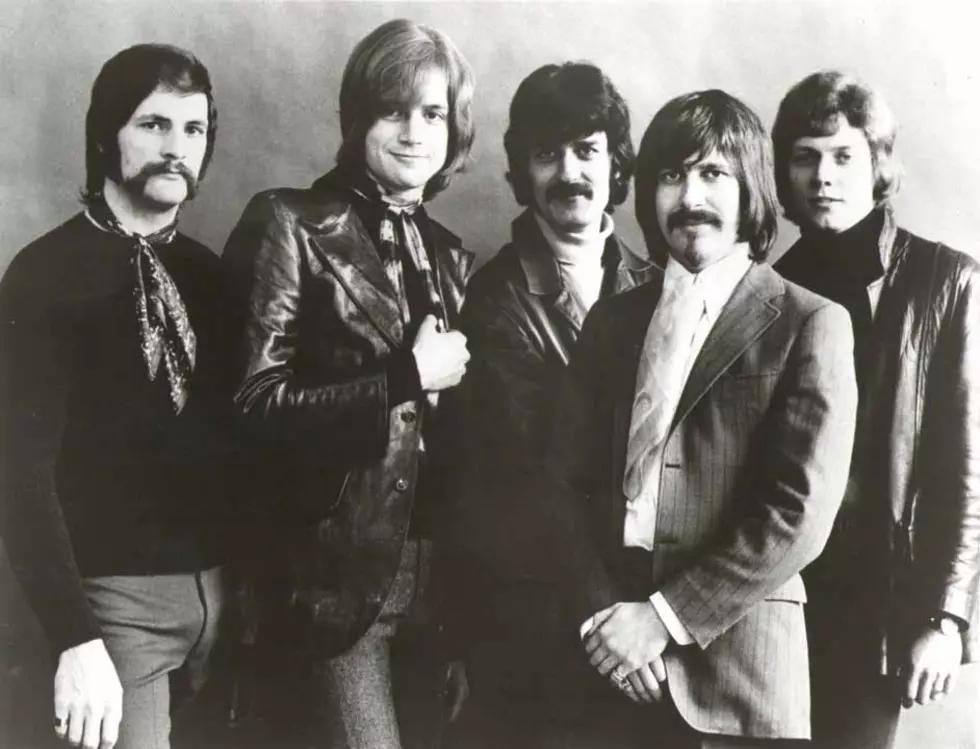
Moody Blues’ Ray Thomas Dies at 76
Moody Blues multi-instrumentalist Ray Thomas has tragically died just months before his long-awaited induction into the Rock & Roll Hall of Fame. He had just turned 76 on Dec. 29.
Esoteric and Cherry Red Records confirmed his death this morning, saying Thomas "passed away suddenly at his home in Surrey on Thursday." Thomas revealed, via his personal website, that he'd been diagnosed with inoperable prostate cancer in 2013, but no official cause of death was initially mentioned.
Thomas wrote or co-wrote more than 25 Moody Blues songs, beginning with "Another Morning" and "Twilight Time" from 1967's Days of Future Passed, but he will perhaps always be best remembered for his distinctive contributions on flute. He played the instrument on a few early songs during their Denny Laine-led R&B era, but then became an integral part of the Moody Blues' groundbreaking shift toward progressive rock thereafter.
"My grandfather gave me a flute when I was a young man," Thomas told the Hit Channel in 2016. "I never took any lessons on flute myself. The thing was the flute blends beautifully with the strings and the stuff on the mellotron."
Thomas first collaborated with future Moody Blues bandmates John Lodge and Mike Pinder during early '60s stints in Birmingham, England-based R&B groups like El Riot and the Rebels and the Krew Cats. Graeme Edge, Laine and Clint Warwick completed the early Moody Blues lineup, which memorably scored a No. 1 U.K. hit with "Go Now." Lodge then replaced Warwick, while Justin Hayward took over for Laine, and the band shifted musical focus.
Thomas added a key flute solo to their signature hit "Nights in White Satin," as Days of Future Passed soared to platinum-selling status in the U.S. He later confirmed that he and Pinder sang backup vocals on the Beatles' "I Am the Walrus," and that he played harmonica on "Fool on the Hill," from Magical Mystery Tour.
His song "Legend of a Mind," an impish hat tip toward LSD guru Timothy Leary from 1968's In Search of the Lost Chord, later emerged as a concert favorite. Thomas also released a pair of solo albums (1975's From Mighty Oaks and 1976's Hopes Wishes and Dreams) while the Moody Blues were on hiatus, but subsequently had a diminishing role as the group turned toward synthpop in the '80s.
He made a welcome creative return on 1991's Keys of the Kingdom, writing one song and co-writing another, but Thomas then began dealing with mounting health issues. In 2002, he decided to retire from the Moody Blues.
Listen to the Moody Blues Perform 'Legend of a Mind'
"I can't really perform anymore; I've got this balance problem and it’s called cerebellar ataxia and it's like a short circuit in the brain," Thomas told Ray Shasho in 2015. "If I lose my balance, by the time my brain tells me that I've lost my balance, I could be on the floor. The signal has to travel a longer route to the place where it says you're going to fall over. So, it's really very debilitating. It's incurable, so I just live with it."
Thomas' appearances on stage and in the studio were sporadic after that. He contributed a new song titled "The Trouble With Memories" for a 2010 box set that collected his two solo projects, and collaborated on Lodge's solo album 10,000 Light Years Ago five years later.
"We're still best of friends," Lodge told Ultimate Classic Rock in 2015. "We share the same doctor; we send birthday cards to each other and everything else. I'd written this song called 'Simply Magic' and I thought, it's perfect for Ray. If this was a Moody Blues song, Ray would be playing flute on this. So, I rang him up and I said, 'Ray, I’ve written this song called "Simply Magic." Will you come and play flute?' and he said, 'Well, of course!'"
Thomas was named a member of the Moody Blues' 2018 Rock & Roll Hall of Fame induction class in December. Hayward had expressed initial hopes that the band could use the occasion for a reunion with Thomas and Pinder, the latter of whom left in 1978.
Esoteric and Cherry Red Records released 10,000 Light Years Ago, and also reissued both the Moody Blues' 1965 debut The Magnificent Moodies and Thomas' solo albums. "We are deeply shocked by his passing and will miss his warmth, humor and kindness," the label said in an official news release. "It was a privilege to have known and worked with him and our thoughts are with his family and his wife Lee at this sad time."
Remembering Rockers We Lost in 2017
More From Ultimate Classic Rock









